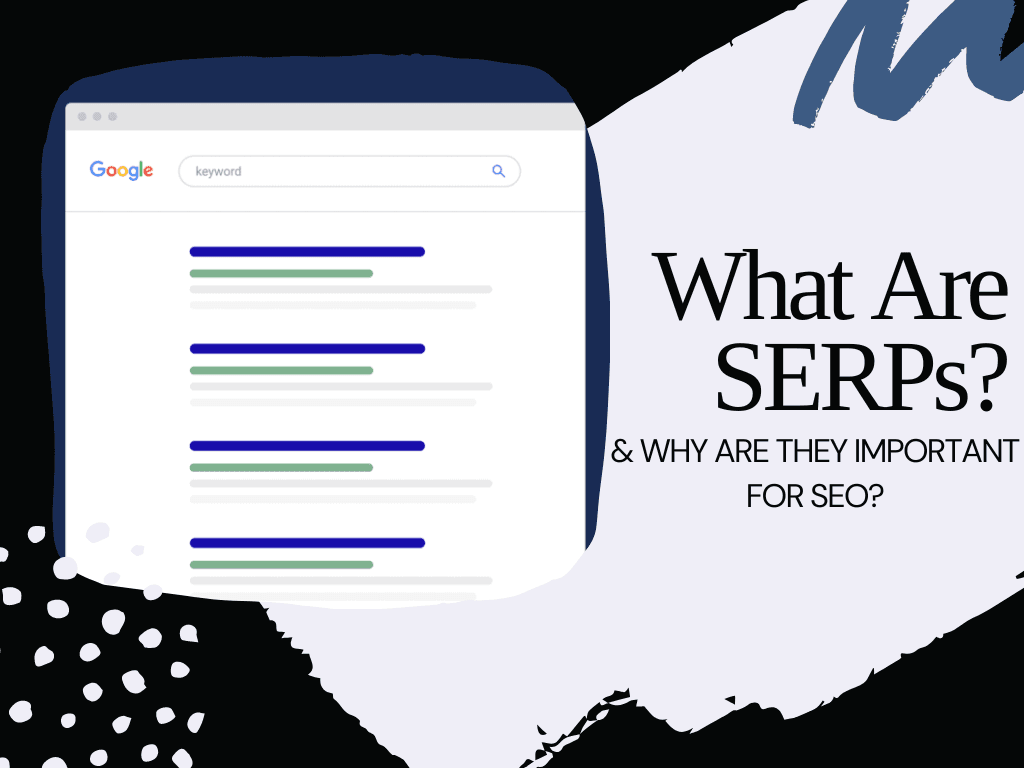In this guide, we'll break down everything you need to know about search engine result pages (SERPs) and their significance for search engine optimization (SEO). By understanding the fundamentals of SERPs and their role in SEO, you'll be better prepared to optimize your website for enhanced visibility and drive more organic traffic to your site.

A search engine results page (SERP) is the page displayed by a search engine, such as Google, Bing, or Yahoo, in response to a user's query. The primary goal of a SERP is to provide users with the most relevant and useful information for their search query. SERPs typically consist of a mix of organic search results, paid search results (ads), and SERP features such as featured snippets, images, news articles, and more.
Basically, a SERP is what you get back when you type (or speak) something to Google. Every query generates a unique SERP, and even the same query can produce different results depending on the searcher's location, device, search history, and other personalization factors.
As search engines continue to evolve to provide a better user experience, SERPs now feature various elements beyond the traditional "ten blue links." Understanding what appears on SERPs — and how to earn those placements — is the foundation of any successful SEO strategy.
Understanding and optimizing for SERPs is crucial for SEO success. Higher visibility on SERPs leads to more clicks and organic traffic to your website. With the majority of users tending to click on the top search results, it's essential to optimize your website to rank as high as possible.
Higher SERP rankings directly translate to more organic clicks. The top 3 results capture the vast majority of clicks, making ranking position critical for traffic.
SERPs are highly competitive. Understanding the SERP landscape and optimizing accordingly helps you outperform competitors vying for the same keywords.
SERP features like featured snippets, knowledge panels, and rich results provide enhanced visibility that can dramatically increase your click-through rate.
SERP rankings are the most tangible way to measure if your SEO efforts are working. Tracking your positions over time reveals what strategies are paying off.
Additionally, SERP features like featured snippets, images, and videos provide users with a richer search experience. By optimizing your content for these features, you can enhance the user experience and increase the likelihood of clicks to your site. Monitoring where you and your competitors rank in SERPs helps you understand which keywords to target and where to focus your efforts.

Optiwing's SERP Checker tracks your keyword positions across Google in real time. See exactly where you rank and how your positions change over time.
Modern SERPs include far more than just organic listings. Here are the most important SERP features every SEO professional should understand:
Advertisements displayed at the top or bottom of SERPs, often marked with an "Ad" label. These are managed through Google Ads and similar platforms.
Selected search results that appear at the top of organic results, providing a quick answer to the user's query — often called "position zero."
A group of local business listings displayed for location-based searches, showing a map and typically three business results.
Visual content related to the search query, presented in carousels or integrated within organic results for richer search experiences.
Recent news articles related to the search query, displayed in a "Top Stories" carousel for timely, newsworthy topics.
Informational panels or boxes that provide instant answers or additional context about a specific topic, entity, or person.
Understanding which SERP features appear for your target keywords helps you tailor your content and technical SEO to capture those placements. For example, implementing structured data (schema markup) can help your pages qualify for rich results, review stars, FAQ accordions, and other enhanced SERP features.
To improve your website's performance on SERPs, there are several key optimization strategies to implement. Here are the most impactful approaches:
Optimize your website's content, meta tags, header tags, and URL structure to target relevant keywords and improve your site's visibility on SERPs. Creating high-quality content that is informative, engaging, and user-focused will provide value to your audience and increase your chances of ranking higher. This is especially important due to the Google Helpful Content Update.
Improving site speed is another crucial factor, as it ensures that your website loads quickly on both desktop and mobile devices. A majority of Google searches come from mobile, so optimizing for mobile is especially important.
Leveraging schema markup and implementing structured data can help search engines better understand your content and potentially trigger rich results or other SERP features. This includes FAQ schema, review schema, how-to schema, and more.
Optiwing's Schema Helper tool makes it easy to generate properly formatted structured data for your pages, helping you qualify for enhanced SERP features like rich snippets and FAQ accordions.
Keyword grouping is a powerful SEO strategy for improving SERP rankings. By grouping semantically or search-result-related keywords into clusters, you can target multiple keywords with a single piece of content and avoid keyword cannibalization.
You could perform this process manually by searching for each keyword and comparing the results pages. But there are keyword grouping tools that automate this process, turning it from a tedious time-consuming task into a simple one. Optiwing's Keyword Grouping Tool groups keywords based on live Google SERP overlap, giving you the most accurate clusters possible.
You can also use Optiwing's SERP Similarity Tool to compare the search results of two keywords side by side and determine whether they should be targeted on the same page or separate pages.
Earning backlinks from authoritative websites can improve your domain authority and increase your chances of ranking higher on SERPs. Regularly analyzing your competitors' websites and SERP performance will help you identify gaps, opportunities, and areas for improvement.
Use Optiwing's SERP Similarity tool to compare keyword results, and the Keyword Grouper to cluster thousands of keywords by SERP overlap. 100 free credits on signup.
Keyword Ranking Analysis is one of the most important ongoing SEO activities. You can use rank tracking tools to monitor your website's keyword rankings in SERPs. These tools will automatically track your website's ranking for target search terms and notify you of any changes in position.
This saves you from having to manually check each day to see where your page is ranking in SERPs. Plus, with a SERP checking tool, you can track multiple keywords at once automatically and monitor trends over time to see if your SEO efforts are producing results.
Track where your pages rank for target keywords across Google. Monitor position changes daily and spot ranking drops before they impact traffic.
Learn more →Compare the search results of two keywords side by side to determine if they share the same search intent and should target the same page.
Learn more →Check the monthly search volume for any keyword to prioritize which SERP rankings are worth pursuing and which drive the most traffic.
Learn more →If you are unsure where to start, check out our guide on how to find rankable keywords for a new site to help you find the best keywords to target for a newer website.
Understanding SERPs and their importance for SEO is crucial for improving your website's visibility, driving organic traffic, and staying ahead of the competition. Here is a summary of the key strategies to optimize for SERPs:
SERPs are the battlefield of SEO. Every optimization you make — from on-page content to structured data to backlink building — ultimately aims to improve your position on these pages. The higher you rank, the more organic traffic and visibility your website earns.
To stay competitive, you need tools that help you monitor your SERP rankings, compare keyword results, group related keywords, and optimize your content for rich results. Optiwing provides all of these capabilities in one platform.
Get started with Optiwing for free by creating an account. No credit card required — you'll receive 100 free credits to try the SERP Checker, Keyword Grouper, and all other tools.
SERP stands for Search Engine Results Page. It is the page displayed by a search engine (such as Google, Bing, or Yahoo) after a user enters a search query. The SERP contains organic results, paid ads, and various features like featured snippets, knowledge panels, and local packs.
SERP rankings directly impact how much organic traffic your website receives. Studies show the top 3 organic results capture over 50% of all clicks, while results on page two get less than 1%. Higher rankings mean more visibility, more traffic, and ultimately more conversions and revenue for your business.
You can check your SERP rankings using a dedicated rank tracking tool like Optiwing's SERP Checker. These tools automatically monitor your website's position for your target keywords in Google search results, track changes over time, and alert you to significant ranking shifts — saving you from manually searching each keyword every day.
SERP features are special result types beyond standard organic listings, such as featured snippets, knowledge panels, local packs, image carousels, and "People Also Ask" boxes. To optimize for them, structure your content to answer specific questions clearly, use proper header tags, implement schema markup (structured data), and ensure your content is comprehensive and well-organized.
Keyword grouping uses SERP data to determine which keywords share the same search intent. Tools like Optiwing's Keyword Grouper compare the top 10 Google results for each keyword — if two keywords share 3 or more top-ranking URLs, they likely have the same intent and should be targeted on the same page. This prevents keyword cannibalization and helps you rank more efficiently. You can also use the SERP Similarity tool to compare two specific keywords.
SERP rankings can change daily due to algorithm updates, new competing content, backlink changes, and other factors. This is why continuous monitoring is essential. Using a SERP checker tool allows you to track these fluctuations automatically and respond quickly when your rankings shift. Consistent content updates, backlink building, and technical SEO maintenance help maintain stable SERP positions.